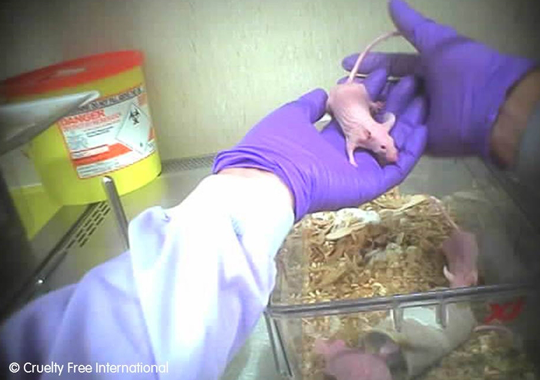Home Office agrees to correct Imperial College animal testing report
Move made under pressure from High Court judge
 The Home Office has finally, under pressure from a High Court judge, agreed to correct its misleading report into animal experiments at Imperial College London.
The move is the latest development following our landmark undercover investigation of animal experiments at world-leading university, Imperial College in 2012. We found a catalogue of misery and poor practice, including animals who suffered even more than was allowed in the experiment because of staff incompetence and neglect.
The Home Office, which regulates animal experiments, subsequently conducted its own investigation and found ‘a generally poor culture of care’ at the College.
In December 2013, the UK government issued a notice to Imperial requiring substantial improvement in key areas, including the use of alternatives methods to minimise animal suffering. It later published a report of its investigation.
Serious criticisms of animal research at Imperial were also made by an independent review commissioned by the College and the Government’s own advisory body.
The Home Office report claimed that inspectors investigated 180 allegations by Cruelty Free International of breaches of the law by researchers and found only five to be established. In fact, it emerged that the inspectors only formally investigated 18 allegations, finding five sets proven, as well as wide-ranging general deficiencies at Imperial College.
However, animal researchers – and the College – seized on the ‘only 5 out of 180’ claim to undermine the credibility of Cruelty Free International and our investigation. This misrepresentation has caused considerable damage and we have had to work hard to correct it. But the Home Office refused to correct the report, so Cruelty Free International asked the High Court to force it to do so.
Under strong pressure from the judge, the Home Office finally agreed to the correction. She noted that Cruelty Free International had been forced to come not only to the door of the court but through it before the Home Office did the sensible thing.
The case also challenged the weak penalties imposed on Imperial licence-holders. Even where researchers were found to have caused, without authorisation, ‘a major departure to animals’ usual state of health or well-being’, they simply received a reprimand with a requirement for more training.
We have raised with the Home Office its pattern of dishing out weak penalties for breaches in animal welfare. However, the judge decided that the penalties for Imperial College London fell within the Home Office’s wide ranging decision-making powers.
Michelle Thew, Cruelty Free International Chief Executive, said:
“It was always perplexing why the Home Office steadfastly refused to correct an obvious error which they could see was causing us damage. We remain very concerned about lenient penalties for licence infringements and will continue to pursue this. It sends completely the wrong message to animal researchers, and the public.”
Read more about our investigation at Imperial College London
The Home Office has finally, under pressure from a High Court judge, agreed to correct its misleading report into animal experiments at Imperial College London.
The move is the latest development following our landmark undercover investigation of animal experiments at world-leading university, Imperial College in 2012. We found a catalogue of misery and poor practice, including animals who suffered even more than was allowed in the experiment because of staff incompetence and neglect.
The Home Office, which regulates animal experiments, subsequently conducted its own investigation and found ‘a generally poor culture of care’ at the College.
In December 2013, the UK government issued a notice to Imperial requiring substantial improvement in key areas, including the use of alternatives methods to minimise animal suffering. It later published a report of its investigation.
Serious criticisms of animal research at Imperial were also made by an independent review commissioned by the College and the Government’s own advisory body.
The Home Office report claimed that inspectors investigated 180 allegations by Cruelty Free International of breaches of the law by researchers and found only five to be established. In fact, it emerged that the inspectors only formally investigated 18 allegations, finding five sets proven, as well as wide-ranging general deficiencies at Imperial College.
However, animal researchers – and the College – seized on the ‘only 5 out of 180’ claim to undermine the credibility of Cruelty Free International and our investigation. This misrepresentation has caused considerable damage and we have had to work hard to correct it. But the Home Office refused to correct the report, so Cruelty Free International asked the High Court to force it to do so.
Under strong pressure from the judge, the Home Office finally agreed to the correction. She noted that Cruelty Free International had been forced to come not only to the door of the court but through it before the Home Office did the sensible thing.
The case also challenged the weak penalties imposed on Imperial licence-holders. Even where researchers were found to have caused, without authorisation, ‘a major departure to animals’ usual state of health or well-being’, they simply received a reprimand with a requirement for more training.
We have raised with the Home Office its pattern of dishing out weak penalties for breaches in animal welfare. However, the judge decided that the penalties for Imperial College London fell within the Home Office’s wide ranging decision-making powers.
Michelle Thew, Cruelty Free International Chief Executive, said:
“It was always perplexing why the Home Office steadfastly refused to correct an obvious error which they could see was causing us damage. We remain very concerned about lenient penalties for licence infringements and will continue to pursue this. It sends completely the wrong message to animal researchers, and the public.”
Read more about our investigation at Imperial College London
